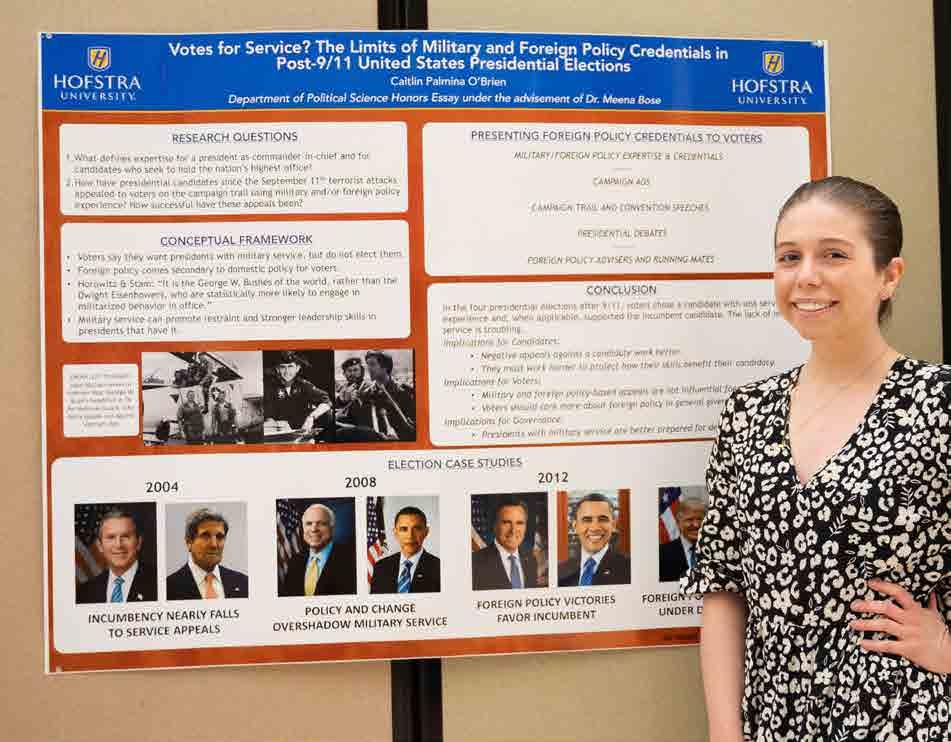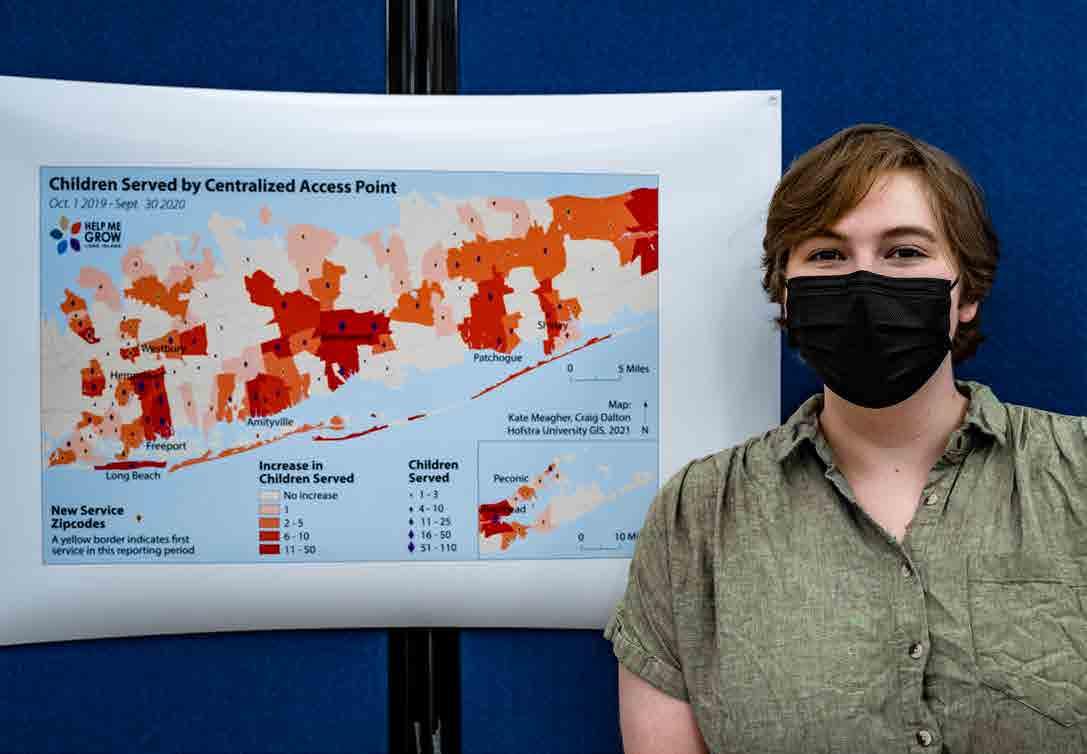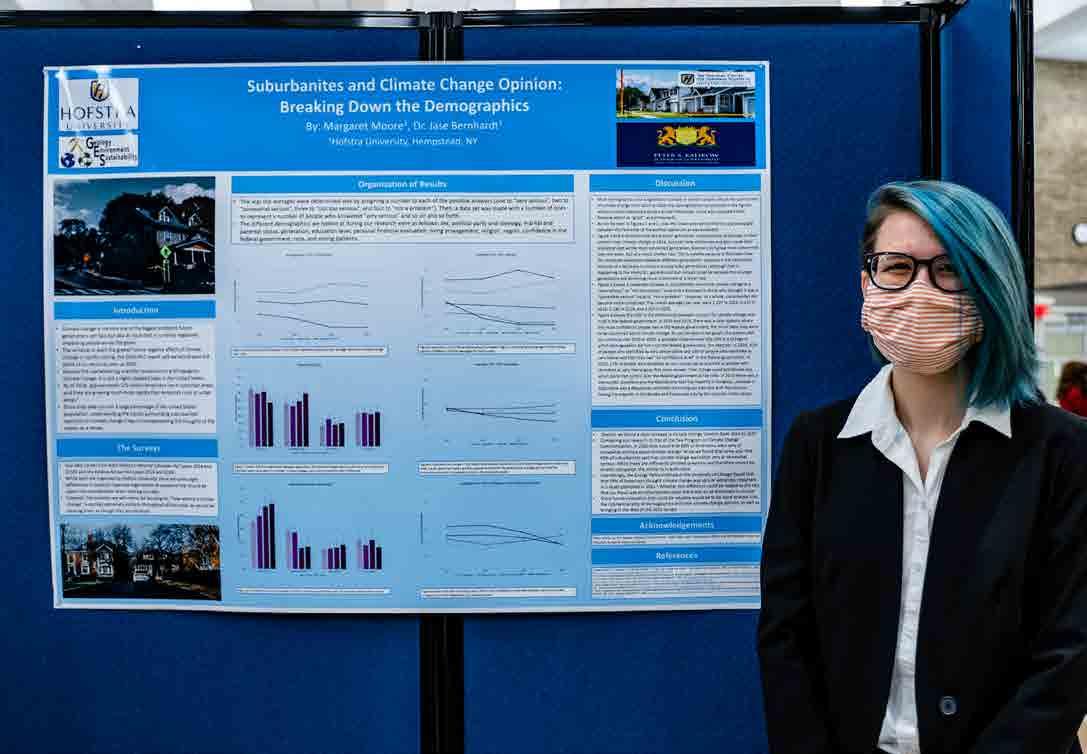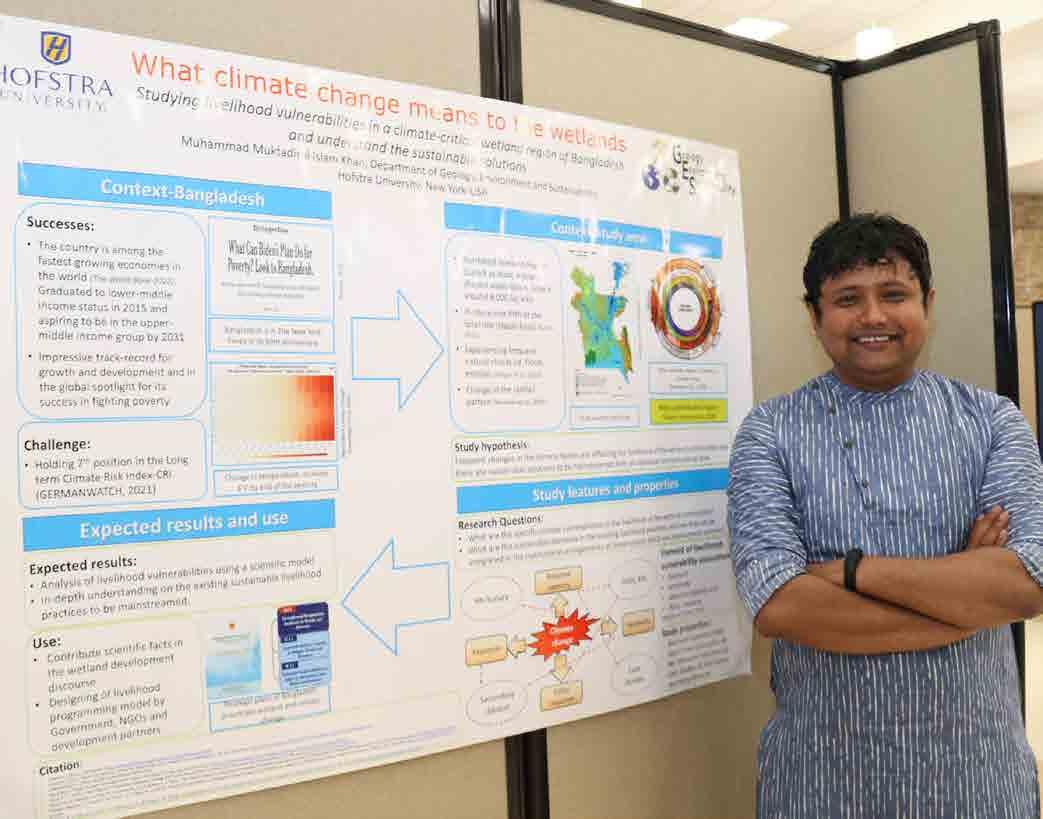
10 minute read
Political Science, Geography, Geology, and Sustainability
Caitlin O’Brien
BA, Journalism and Political Science, May 2022 Hometown: West Roxbury, MA
Advertisement
Project Title: Votes for Service? The Limits of Military and Foreign Policy Credentials in Post-9/11 United States Presidential Elections
Advisor: Meena Bose
Written by Leah Chiappino
Caitlin O’Brien, a May 2022 graduate with majors in journalism and political science, spent her final year at Hofstra University researching the impact of military service on presidential electability, all while interning at MSNBC and serving as news director at WRHU-88.7 FM, Radio Hofstra University.
Her research looked at post-9/11 presidential campaigns, and how military and foreign policy-based rhetoric has influenced elections.
“Bottom line, military service, foreign policy credentials don’t matter very much on the campaign trail. It’s really troubling that more presidents don’t have military service in their backgrounds and that they don’t have a lot of foreign policy experience because it might not matter on the campaign trail if a candidate can’t talk intelligently about foreign policy, but it sure matters once they’re in the Oval Office,” she said.
O’Brien, who is from West Roxbury, MA, was inspired to investigate the topic by her father, a Vietnam veteran.
“He’s super politically active, and we always talked about military service and elections, so I was like, why not? I’m going to look into this a bit,” she said.
Working with Dr. Meena Bose of the Political Science Department, O’Brien started her research in summer 2021. She began slowly researching, cutting down information, and figuring out what directly applied. She would meet with Dr. Bose multiple times a week to discuss research and get ideas.
“I’m very thankful for her,” O’Brien said.
The research is set to be published by the Center for the Study of the Presidency and Congress in Washington, D.C., where O’Brien held a fellowship. She recently had the opportunity to present her research to policy leaders such as Senator Susan Collins, Senator Angus King, and even Dwight D. Eisenhower’s granddaughter.
She is now working as an associate producer and assignment desk editor at WJAR-TV in Providence, Rhode Island.
Caroline Czerwonka
Advisor: Carolyn Dudek
Has Democracy Been Saved in the Czech Republic?
Caroline Czerwonka Department of Political Science
A Study of Democratic Growth and Transformation from Post-Communist Transition to October 2021 How an Active Civil Society and Political Society can Work Together to Halt Democratic Backsliding and Illiberal Politics
Historical Impact: Civil Society and the Velvet Revolution (1989)
1968: Prague Spring (top-down initiative) 1969: Self-Immolation of Jan Palach 1 January 1977: Charter 77 1989: přestavba and growing active opposition January 1989: Palach Week 17 November 1989: 50,000 person protests in Prague and each consecutive day afterward 28 November 1989: Communists cede power December 1989: Václav Havel nominated as interim president December 1992: Dissolution of Czechoslovakia
2011-2021: ANO Movement and Andrej Babiš
May 2019, October 2020: European Commission investigation and audit confirmed Babiš breach of EU and domestic conflict of interest laws 23 June 2019: 250,000 person protest for resignation of PM Babiš and decrease of ANO’s control
One Million Moments for Democracy: Czech civil society as a
“maxidog” 9 June 2020: protest by One Million Moments for Democracy against Extraordinary Measures Ministry of Health April 2021: European Commission audit again determines Babiš breaches conflict of interest rules
Determined that Czech Republic should return all EU subsidies that Agrofert received after Babiš became a public official in
February 2017 October 2021: Pandora Papers released by ICIJ- PM Babiš implicated to have put over 17.3 million euros into shell companies to buy 16 French properties
October 2021 Parliamentary Elections: Coalition-Building
65.4% of registered voter participation (highest since 1998)
SPOLU (“Together”) : Civic Democratic Party, Christian Democrats, and TOP 09 receives 27.8% of vote // 71 seats ANO: 27.1% of vote // 72 seats // won the popular vote PirSTAN: STAN and Pirate Party: 15.6% of vote //37 seats SPOLU and PirSTAN coalition: 108 / 200 seats
New Prime Minister: Petr Fiala (ODS- SPOLU)
Comparative Analysis: Hungary and Poland’s Transition
Poland - Civil Society: Solidarność (1980) -Roundtable discussions spring 1989, free elections in
June Hungary two significant anti-government strike protests in March and June 1989 “Roundtable negotiations” beginning in 1989
Comparative Analysis: Fidesz (Hungary) and Law and Justice (Poland)
: Fidesz comes to power in 2010
New Constitution drafted in April 2011
Creation of Judicial Office and packing the courts
“Foreign Agent” Law : Law and Justice Party comes to power in 2005 2015 campaign to reconstruct role of state, economic patriotism, opposition to EU refugee policy, and conservative social issues
National Institute of Freedom- Center for Civil Society Development
Comparative Analysis: Hungary’s April 2022 Parliamentary Election
Six Main Opposition Parties form coalition to defeat Fidesz Fidesz wins 88 / 106 voting districts // 135 seats of 199 Opposition Alliance wins 56 seats
Strong Gerrymandering, pro-Orban news outlets and public media, LGBT referendum **what capacity does each society possess to make subsequent change without restraint?**
Written by Leah Chiappino
Caroline Czerwonka focused her research on democratic backsliding in the Czech Republic.
“I determined that because of the results of the 2021 election, democracy has been temporarily saved,” she said.
Democratic backsliding refers to the state elimination of political institutions that comprise a democracy. A European Studies minor, Czerwonka wanted to get research experience to prepare for graduate school.
“I’ve always been interested in Eastern European politics, she said. “Everyone talks about Poland and Hungary in terms of backsliding, and I wanted to see if there were any other states. I found the Czech Republic,” she said.
Czerwonka worked with Dr. Carolyn Dudek, a Hofstra political science professor and expert on European affairs. They met once every three weeks beginning last spring to review drafts until they had finished the product.
“I found that within the Czech Republic, an active political and civil society can, together, stop populist parties and tyrannies,” she said.
In the fall, Czerwonka plans to attend Sciences Po, a research university in Paris, to begin a master’s program in international government, with the goal of pursuing a career in public service.

Kate Meagher
Written by Leah Chiappino
Kate Meagher
BA, Geography and Sustainability Studies, May 2022 Hometown: Airville, PA
Project Title: Sustainable Development: Exploring Urban Green Spaces
Advisor: Craig M. Dalton
Kate Meagher, a senior geography and sustainability major (in a dual-degree program) from Airville, Maryland, was able to gain hands-on experience in cartography work by creating a map to show the growth of Help Me Grow Long Island, a local nonprofit that assists families with children in need of medical care, since the pandemic began.
The organization provided Meagher with the number of children they helped in each ZIP code from 2018 to 2019, as well as a new set of similar data from November 2019 to October 2020. This showed the organization was able to assist hundreds of additional families in over 30 new ZIP codes since the pandemic began.
With the help of Craig Dalton, associate professor of global studies and geography, who approached Meagher with the project, she was able to create a map using GIS technology to show the organization’s growth. The process, which took about a month, involved taking data and making sure it was compatible with the GIS.
The end product wound up being published in the nonprofit’s annual report on its website.
“It was a really good experience working with clients, and it was also a really good opportunity to add something else to my resume and GIS portfolio,” Meagher said.
After graduation, Meagher will continue her education in Hofstra’s five-year sustainability program, graduating with a master’s degree in sustainability in 2023. She hopes to continue her work with GIS by working in environmental research, geospatial analysis, or general map making.
Margaret Moore
BA, Geology, May 2022 Hometown: Neptune Beach, FL
Project Title: Suburbanites and Climate Change Opinion: Breaking Down the Demographics
Advisor: Jase Bernhardt

Margaret Moore
Written by Leah Chiappino
Margaret Moore, a junior geology major and creative writing minor from Neptune Beach, Florida, took the data from Hofstra’s 2014-2020 Kalikow School Polls to show that the average American suburbanite is growing increasingly concerned about climate change.
Moore’s findings are consistent with other prestigious research institutions, such as those of the Yale Program on Climate Change Communication and the University of Chicago.
Dr. Jase Bernhardt, assistant professor of geology, environment and sustainability, approached Moore to work on the project. It involved manually going through all the data and breaking down how people had changed their answers over time, while focusing on specific demographics and cross-referencing. Moore then converted each answer to a score on a scale of 1 to 4, found the average for each demographic, and graphed them. She met with Bernhardt biweekly to maintain their progress.
Moore said she was specifically drawn to climate change and opinion because it’s an intersection between hard science and social science.
“By having our finger on the pulse of those sorts of trends, it could influence the way people approach talking about climate change with those different demographics,” she said. “Personally, it’s not always communicated in a way that’s most effective in convincing people to take positive environmental action.”
Moore would like to expand her research to include 2021 and 2022 polls. She is open to pursuing a wide variety of interests after graduation, but really enjoys playwriting and plans to add a philosophy minor to her studies at Hofstra.
Muhammad Muktadiral Khan
MA, Sustainability Studies Expected graduation: May 2023 Hometown: Dhaka, Bangladesh Project Title: What Climate Change Means to the Wetlands: Studying Livelihood Vulnerabilities in a Climate-Critical Wetland Context of Bangladesh
Advisor: Jase Bernhardt

In basic terms, please describe your project.
Bangladesh has progressed economically. We have proven evidence that Bangladesh has fought poverty, and the poverty rate has decreased 20% over the last 10 years. Environmentally, temperatures are significantly rising in the northeast wetland region; a bowl-shaped water basin area is the most vulnerable to climate change. The people are dependent on agriculture, such as rice, for their livelihood. However, this is deteriorating. For seven or eight months of the year, people face climate shocks like flooding and erosion. Unfortunately, many people have identified that this is the most understudied region of the country. I will study how climate change is adversely affecting the livelihood of that area, while looking for sustainable practices that people are employing now. The hope is to develop these practices. My research will use a mixed method approach to collect qualitative and quantitative data. This will be a yearlong research project. I will return to Bangladesh for my last semester to collect and analyze the data.
How did you become interested in this topic? What inspired you?
I am from this region, and for several years, I was working and dealing with the effects of climate change. I realized I needed to look at this through an academic lens. The United States is the best place to study this topic.
What professor are you working with, and how are they supporting you?
Dr. Jase Bernhardt is supporting and sharing his knowledge with me. I like the educational system at Hofstra. The content and research are readily available and related to the practical work that needs to be done.
Where do you see this research going in the future?
Sustainability is my passion, and I am very happy to be looking at it academically. I am confident that I will be able to apply what I have learned to my own country.
What career or educational plans do you have for after graduation?
I will go back to Bangladesh and continue working for an NGO or for the government.




